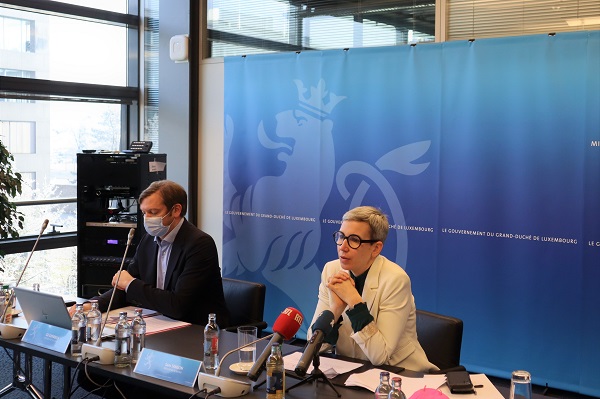 L-R: Gil Goebbels, Ministry of Justice; Sam Tanson, Luxembourg's Minister of Justice;
Credit: MJUST
L-R: Gil Goebbels, Ministry of Justice; Sam Tanson, Luxembourg's Minister of Justice;
Credit: MJUST
On Wednesday 12 January 2022, Luxembourg's Minister of Justice, Sam Tanson, presented a draft bill aimed at transposing into national law the European Union (EU) Directive on the protection of persons reporting on breaches of EU law.
The Luxembourg Government has decided, in accordance with its coalition programme, to extend the material scope of this directive to all national law. This choice is motivated by the desire to guarantee a complete and coherent framework, which is easily understandable and accessible.
This legal framework is designed to guarantee effective and balanced protection for whistleblowers by introducing a genuine status for them, comprising clearly defined rights and obligations.
From now on, persons who report violations defined as “acts or omissions which: a) are unlawful; or b) run counter to the object or purpose of provisions of national or European law of direct application, in so far as the consequence is a disturbance to the public interest" will be protected.
To be able to benefit from the status of “whistleblower”, certain conditions, largely inspired by the case law of the European Court of Human Rights (ECHR), must be respected.
Whistleblowers must have reasonable grounds to believe that the reported information on violations is true at the time of the report and that such information falls within the scope of this act. Moreover, the reporting must have been made either internally or externally or in accordance with the framework provided for public disclosures.
Public disclosure is subject to the following conditions:
- the individual first made an internal and external report (or made an external report directly), but no appropriate action was taken in response to the report within the expected timeframe;
- the person has reasonable grounds to believe that the violation may represent an imminent or manifest danger to public interest, such as when there is an emergency or a risk of irreversible harm;
- there is a risk of retaliation or there is little chance that the violation will be effectively remedied due to the particular circumstances of the case, such as when evidence may be withheld or destroyed or when an authority may be in collusion with the perpetrator of the violation or involved in the violation.
In order to guarantee access to an internal reporting channel, the bill provides for the obligation for legal entities in the private and public sectors to put in place procedures for internal reporting and follow-ups.
Legal entities in the public sector include any entity owned or controlled by it, including the administrations of municipalities with more than 10,000 inhabitants.
Legal entities in the private sector are only covered if they have at least 50 employees. The directive provides for a two-year transition period, until 17 December 2023, to implement the internal channels obligation in private sector legal entities employing between 50 and 249 people.
For legal entities governed by private law with 250 workers or more, the obligation is immediate.
Whistleblowers can freely choose to report internally or externally, i.e. to a competent authority such as the CSSF, Luxembourg's financial regulator, and the Inspectorate of Labour and Mines (Inspection du travail et des mines - ITM).
The procedure and follow-up for reports made to a competent authority are more or less the same as internally:
- the whistleblower receives an acknowledgment of receipt within seven days;
- he / she is informed of the follow-up given to his / her report within three months, respectively six months;
- the confidentiality of the whistleblower's identity is guaranteed at all levels.
In order to inform and guide the potential whistleblower in these procedures, the bill provides for the creation of a “reporting office”.
While reducing the legal insecurities to which whistleblowers are currently exposed, the future law is expected to help strengthen respect for the rule of law.








